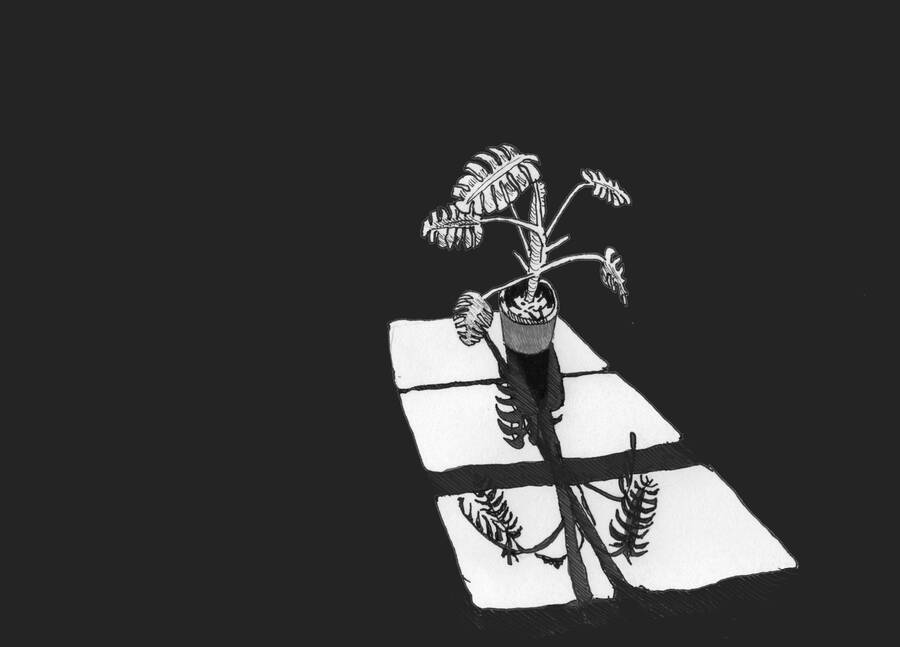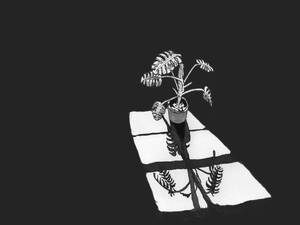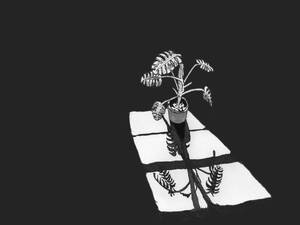Provisions #1: “languages I didn’t know I wanted to know”
Meditations in a crisis on poems by Solmaz Sharif, Mary Karr, and June Jordan.

In “Provisions,” three poetry readers reflect on a poem they’ve been holding close during this difficult time.
An umbrella plant sits on my windowsill. I sing a song as I give her water. She looks away from me, toward the light. What else enters my morning: a pinch of salt, a text from my cousin, stray notes from my neighbor’s record player—tiny, precious things, small counterpoints to the world’s colossal violence and enormous grief.
In the spirit of the small, here, every other Friday, three people will offer a brief response to a poem they’re holding close—some work that’s nourishing them in a time of need. We don’t know how long this will last. Already, one participant had to pull out; she had begun to feel ill. Even as I write this, my own breath is too short to stretch over a line of my favorite poem. Still, I need poems now to pull me toward my breath, my body, to give form to formless things (love, pain, death), to teach me how to exist with what I don’t understand.
I’m especially grateful, these days, for how poetry can help us to live alongside absence, not to rush to fill it in. Little word unspooled from meaning, little line break, little plant inside an apartment. My hope is that we can come together in this space. I want to nourish something small, here, where I am. To join with your small here. To see what grows.
—Claire Schwartz
LATELY, I’ve been holding Solmaz Sharif’s “Civilization Spurns the Leopard” close for its dedication to the gloriously quotidian—chattering sparrows, bare trees, potholes, pools of water. Its rhythms feel almost sinfully languorous, like so many of my evenings now. I rest, read, peel vegetables, oil my hair, spring clean, stretch, process. In this state of slowness, I am more acutely aware of my body. I register each new ache. “To step out of my door and hope to see something like a life,” Sharif writes. London feels lonelier, if that’s even possible. Those who can afford to have fled to country homes; the rest of us plod along to the best of our ability. My mother tells me another person in her social circle has fallen ill. The WhatsApp Auntie Network remains a sinuous web of misinformation and grief. Loved ones conduct birthdays via video call. Our Rasta neighbor punctuates the air with garage throwbacks. Some of the neighbors—now working from home—have begun to complain.
I feel perched on the edge of a historical rupture we are only beginning to understand. This is the easiest part to admit. What’s harder to convey is the nauseating smugness of being proven right in the worst of ways. For those of us carrying histories of catastrophe as diasporic muscle memory, even our anxieties have anxieties. Word to Charlie Brown. Our survival instincts kick in with a predictable urgency. We have always known we would one day have to outrun or acclimate to the apocalyptic. “To lose even the loss.” After all, it has happened before.
There’s no joy in such confirmation. Still, there is the solace in knowing we can channel our creativity toward something other than cruelty, toward caring for each other. As a result of lockdown, an increasingly concerned central government has ordered councils across England to provide accommodation for the unhoused. Hotels are offering beds to rough sleepers. We don’t have to accept hunger, income inequality, disempowering atomization, punishing sanctions, or disregard for the elderly and vulnerable. We can’t go back. We are still trying on this new world for size. I’m learning the shape of things anew, in “languages I didn’t know I wanted to know.”
Though a terrifying expanse of indeterminate months lies ahead, I find comfort in the people and poems I will share this weight with. From Oakland to Shiraz, we are the “single likeness” Sharif describes. The uniformity of our days tethers us to one another. Never have I had so much in common with so many people. Nightly, I fall asleep mid-conversation. On the other end of the line, someone I love breathes.
—Momtaza Mehri
QUARANTINE has me nervous and irritable. It’s been hard to be kind to my family. Though we’re lucky to be sheltered together, gratitude and generosity are not coming as quickly or as easily as I’d like. I haven’t experienced an overwhelming urge to read or write; indeed, I feel a little repulsed by the idea. In the past, I’ve often found poetry to be a liberating space—a space where I can, to quote Paul Celan, “push the question further,” destabilizing what I think I know. But now, amid so much uncertainty, I am drawn toward simple, sturdy thinking. I reach for a poem that a dear friend and fellow drunk shared with me in the most anxious days of my early recovery: Mary Karr’s “The Voice of God.”
The poem opens with a bluntness that shocks me into listening: “Ninety percent of what’s wrong with you / could be cured with a hot bath.” The gorgeously straightforward directive of “The Voice of God” offers some relief from my diffuse worryings. Taped to my wall, printed and folded in my wallet, saved to my phone for instant accessibility, recited as prayer in a dark moment, this poem has been a compass I can retrieve and use to locate myself when I’ve lost my bearings.
In sobriety, God’s voice has become an active, ordinary presence in my life—as practical as it is metaphysical. It’s understandable that “we want magic” from God; after all, my prayers are macro, on the scale of my global fears. But the poem reminds me that I have a body requiring maintenance, physical and spiritual. If I cannot listen to the churning in my stomach, if I forget to regularly practice prayer, if I do not keep myself in order, I cannot possibly hope to hear any voice, soft or tremendous, that might be seeking my response. “It is small & fond & local,” writes Karr. “Don’t look for your initials in the geese / honking overhead.” Absent any flaming shrubbery, all I can do is try to follow that voice long enough to do the next right thing. Even when I keep running up against anger and despair, the voice of God is clear, in its tiny way, humming: breathe, slow, disengage, relax for a minute, eat a sandwich.
—Chase Berggrun
DURING these strange and scary times, I’ve been holding June Jordan’s “Roman Poem Number Thirteen” especially close. When I read about nurses and doctors forced to ration ventilators, I think of these wrenching lines: “who can choose between the worst possibility / and the last / between the winners of the wars against breathing / and the last / war everyone will lose.” Another politician argues that we should restart the economy, death rate be damned, and I think, here is “the dry gas / domination of the future.” When I see Trump congratulate himself in yet another press conference while US sanctions continue to strangle Iran, I remember “the consequences of the killers / and the past / of all the killing.”
The line breaks in this poem are jarring, and the internal rhyme throws the reader into a vortex of sounds. But for all the strange and horrifying beauty of the first 14 lines, the last lines are quiet, almost swallowed: “Your voice / breaks very close to me my love.” It’s a heartrending volta—where a bleak picture of life at an empire’s end gives way to an intimate scene between lovers, the nebulous “our” now clearly held by the “you” and “me.” The final lines describe a brutal, precise sadness that renders the brutality of the preceding lines more real and more felt. The poem reaches for connection with the beloved—reaches, I imagine now, through isolation, through grief, through the fear of being unable to pay your rent, through the fear of every cough and ache, and through other, greater fears.
I believe in the collective. Alone, we are protecting each other. But I am not quite alone. Three months pregnant, I lie in bed, vomit into a trashcan, and scour the news for an ounce of hope. What world am I bringing this child into? Will he be born into isolation, into silence, in a hospital hushed by so many deaths? As the virus snakes up the coastline, in my darkest moments, I wonder if he will be born at all. I hope he will. My heart is arguing hard for him.
I read my child this poem aloud, over and over. I sing it to him softly. My voice—and Jordan’s—are the first ones he will hear. Usually, I can’t get through the last line without crying. I read it anyway. I read it for the pregnant women still showing up to work in hospitals and grocery stores without protective gear while I shelter at home and grind my teeth to dust. I read it for all of us, together, struggling to do our part through the great terror of what we don’t know. I’m reading it for you, too, wherever you are. Your voice breaks very close to me my love.
—Essy Stone
Momtaza Mehri is a poet working across criticism, translation, education, and radio. Her collection Bad Diaspora Poems won an Eric Gregory Award and has been shortlisted for a Forward Prize.
Chase Berggrun is a trans woman poet. She is the author of R E D (Birds, LLC, 2018). Her work has appeared in American Poetry Review, Poetry, Academy of American Poets’ Poem-a-Day, and elsewhere.
Essy Stone is the author of What It Done to Us (Lost Horse Press, 2017). Her work has appeared in The New Yorker, 32 Poems, Gulf Coast, and elsewhere. She is completing her PhD at USC, where she is a Wallis Annenberg Fellow.



